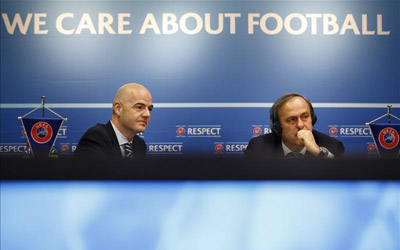UEFA Defend FFP After Lawyer Questions Legality of the Rule
March 27, 2013
UEFA has moved to defend their financial fair play (FFP) rules after the lawyer behind the Bosman ruling, claimed it would breach European competition law.
Jean-Louis Dupont admitted that the European Commission agreed with FFP, but was unsure the European Court of Justice would feel the same.
However a UEFA spokesman said: “UEFA is aware, that there are large differences between the comparative wealth of different clubs and countries, but financial fair play does not have financial equality as its objective.
“However, more investors should be attracted if club football is more sustainable and those clubs with sustainable and stable business models will be in a position to become more competitive.”
Violation of EU competition law
Writing in a column for the Wall Street Journal, Dupont previously commented: “Some of Europe’s biggest clubs are, unsurprisingly, the loudest supporters of rules that entrench their dominance. The time is right for a strong reminder from the EU’s anti-trust authorities that football, like any other multibillion-euro industry, must comply with the law.
“As an agreement whereby industry participants jointly decide to limit investments, FFP likely constitutes collusion and hence a violation of EU competition law. FFP may also infringe other EU freedoms such as the free movement of workers and services.
“Even if FFP were sufficiently legitimate and necessary to justify its distortions of EU principles, however, it would still have to clear a final hurdle: proportionality. UEFA would need to convince the EU’s judges in Luxembourg that FFP is the least restrictive means of achieving its aims. This seems unlikely.”
UEFA’s arguments and who would challenge?
Football law expert, Daniel Geey of Field Fisher Waterhouse told iSportconnect: “UEFA have some strong arguments that can be deployed in the theoretical situation where the FFP rules are challenged.
“UEFA would use arguments that the spending restrictions in place are necessary in order to ensure clubs do not go out of business.
“They would point to their past annual benchmarking reports which showed large year on year losses and high levels of debt at certain clubs. UEFA would argue that without such intervention, there would be a serious risk of clubs going out of business because they are continually living beyond their means.
“Therefore UEFA are promoting the notion of self-sustainability and they would argue such restrictions are necessary to achieve a more sustainable long term future for European football.
“There is no right or wrong until those arguments are weighted up by the court. The real question is who will challenge the rules?”
{jcomments on}


